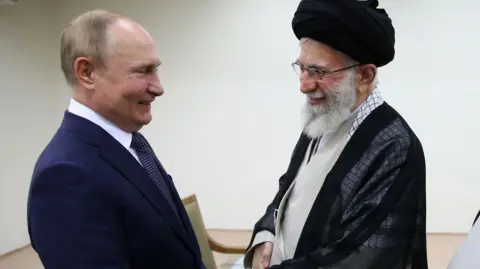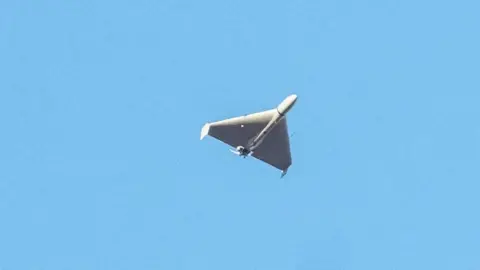Russia Editor
 Reuters
ReutersWhen Israel launched Operation Rising Lion, officials in Russia described the current escalation in the Middle East as “alarming” and “dangerous.”
Still, Russian media were quick to stress the potential positives for Moscow.
Among them:
- A rise in global oil prices which is forecast to boost Russia’s coffers
- The distraction of global attention away from Russia’s war on Ukraine. “Kyiv has been forgotten” was a headline in Moskovsky Komsomolets
- And if the Kremlin’s offer to mediate in the conflict was accepted, Russia could portray itself as a key player in the Middle East and as a peacemaker, despite its actions in Ukraine
However, the longer Israel’s military operation goes on, the greater the realisation that Russia has much to lose from current events.
“The escalation of the conflict carries serious risks and potential costs for Moscow,” wrote Russian political scientist Andrei Kortunov in business daily Kommersant on Monday.
“The fact remains that Russia was unable to prevent a mass strike by Israel on a country with which five months ago [Russia] signed a comprehensive strategic partnership.
“Clearly Moscow is not prepared to go beyond political statements condemning Israel, it’s not ready to provide Iran with military assistance.”
The Russian-Iranian strategic partnership deal which Vladimir Putin and President Masoud Pezeshkian signed earlier this year is not a military alliance.
It does not oblige Moscow to come to Tehran’s defence.
At the time, though, Moscow talked it up.
In an interview with the Ria Novosti news agency, Foreign Minister Sergei Lavrov noted that the agreement paid “special attention to the strengthening of co-ordination in the interests of peace and security on the regional and global levels, and the desire of Moscow and Tehran for closer co-operation on security and defence”.
 Reuters
ReutersIn the last six months Moscow has already lost one key ally in the Middle East, Bashar al-Assad.
After the Syrian leader was deposed last December he was offered asylum in Russia. The prospect of regime change in Iran, the thought of losing another strategic partner in the region, will be of major concern to Moscow.
Commenting on developments in the Middle East on Tuesday, Moskovsky Komsomolets concluded: “In global politics right now, massive changes are taking place in real time which will affect life in our country, either directly or indirectly.”
Vladimir Putin will be spending much of this week in St Petersburg where the city is hosting its annual International Economic Forum.
The event was once dubbed “Russia’s Davos”, but the label doesn’t really apply now.
In recent years the chief executives of big Western companies have stayed away – especially since Russia’s full-scale invasion of Ukraine.
Nonetheless, the organisers claim that this year representatives from more than 140 countries and territories will attend.
Russian authorities will almost certainly use the event to try to demonstrate that attempts to isolate Russia over the war in Ukraine have failed.
An economic forum it may be, but geopolitics is never far away.
We’ll be watching closely for any comments the Kremlin leader makes about the Middle East and about Ukraine.






















